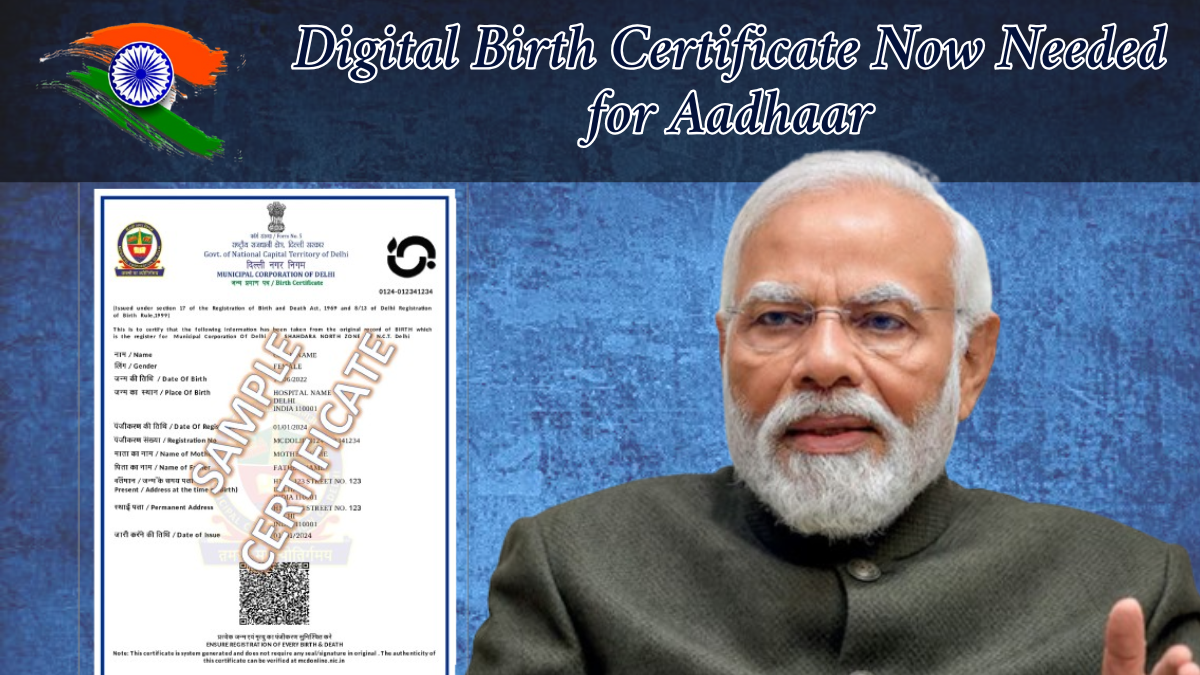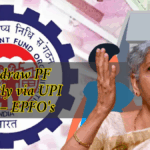The Indian government has taken a decisive step towards complete digitization by mandating the use of digital birth certificates for key services like Aadhaar card issuance, voter ID registration, and educational admissions. This initiative, under the broader umbrella of the Digital India campaign, aims to simplify documentation processes, enhance accuracy, and prevent identity fraud.

Table of Contents
Summary Table: Digital Birth Certificate Now Mandatory for Aadhaar
Feature |
Details |
|---|---|
Policy Change |
Digital birth certificate mandatory for Aadhaar, Voter ID, education |
Benefits |
Accuracy, fraud prevention, ease of access, eco-friendly |
Who Must Comply |
All Indian citizens applying for Aadhaar, Voter ID, or school admissions |
How to Apply |
Through the official Civil Registration System portal |
Official Portal |
What Is a Digital Birth Certificate?
A digital birth certificate is an electronically generated and officially certified document that records an individual’s birth details such as name, date of birth, place of birth, and parents’ names. It holds the same legal validity as a traditional paper birth certificate but is accessible online and protected with digital encryption to ensure security.
Why Has the Government Mandated It?
This move aims to:
- Streamline public services by eliminating manual paperwork.
- Enhance data consistency across platforms like Aadhaar and electoral rolls.
- Prevent fraud by ensuring digitally authenticated identity documents.
- Support environmental sustainability by reducing paper usage.
- Improve user experience by enabling online access and faster verification.
Key Benefits of Digital Birth Certificates
- Fast Verification: Reduces delays in Aadhaar, voter ID, and school admissions.
- Data Accuracy: Minimizes human error in document handling.
- Eco-Friendly: Cuts down on physical paper requirements.
- Fraud Prevention: Lessens the risk of forged documents.
- Effortless Access: Easily downloadable from any location with internet.
- Cost-Effective: Reduces administrative overhead for citizens and the government.
- Secure: Safeguarded with encryption and secure server protocols.
How to Apply for a Digital Birth Certificate in India
Here’s a step-by-step guide to obtain your digital birth certificate:
- Visit the official Civil Registration System (CRS) portal: https://crsorgi.gov.in
- Select your state and registration unit.
- Fill in the required details:
- Name of the child
- Date of birth
- Place of birth
- Parents’ information
- Upload required documents:
- Proof of birth from hospital
- ID proof of parents
- Submit the form online.
- Track your application status through the portal.
- Download the certificate once it is verified and approved by the local registrar.
Impact of Digital Birth Certificates: A Breakdown
Impact Area |
Description |
Time Saving |
Reduces delays in document issuance and verification |
Fraud Reduction |
Eliminates chances of forged certificates |
Data Consistency |
Ensures accurate and centralized data handling |
Environment |
Reduces reliance on paper, promoting sustainability |
User Experience |
Easy access and 24/7 availability |
Cost Efficiency |
Reduces physical infrastructure costs |
Inclusivity |
Accessible in rural and urban areas with internet availability |
Implementation in Educational Institutions
Schools play a critical role in implementing this digital shift. Here are steps to facilitate integration:
- Update IT systems to accommodate digital birth certificate uploads.
- Train staff to handle digital documents efficiently.
- Notify parents about the new requirement via circulars and meetings.
- Collaborate with local government bodies for streamlined document verification.
- Monitor compliance and address technical concerns during the transition.
Challenges and Concerns
While the initiative is forward-thinking, certain challenges persist:
- Limited digital access in remote and underdeveloped regions.
- Digital literacy remains low in certain sections of the population.
- Data security concerns must be addressed to build public trust.
- Initial technical issues during implementation phase.
- Resistance from citizens accustomed to traditional documentation processes.
Government Support & Initiatives
Initiative |
Objective |
Digital Literacy Campaigns |
Teach citizens how to use online services |
Better Internet Infrastructure |
Improve digital access in rural areas |
Helplines & E-Seva Kendra |
Provide technical support for applicants |
Public Awareness Drives |
Promote the importance and benefits of digital records |
Local Training Sessions |
Community-based education on digital processes |
Regulatory Frameworks |
Protect personal data through privacy laws |
What This Means for Future Generations
- Improved efficiency in administrative procedures
- Enhanced access to public services
- Greater trust in the digital ecosystem
- Eco-conscious governance that aligns with sustainability goals
This digitization drive also sets the stage for similar reforms in the issuance of other vital documents such as marriage certificates, death certificates, and caste or domicile certificates.
Frequently Asked Questions (FAQs)
1. What is a digital birth certificate?
Ans. A digital birth certificate is an electronic document issued by government authorities that officially certifies an individual’s birth details. It carries the same legal weight as a traditional paper certificate.
2. Is it mandatory for everyone?
Ans. Yes, the Indian government has made it mandatory for use in applying for Aadhaar, Voter ID, and school admissions.
3. Where can I apply for a digital birth certificate?
Ans. You can apply via the official Civil Registration System portal: https://crsorgi.gov.in
4. Is it safe and secure?
Ans. Yes, these certificates are encrypted and stored on secure servers to prevent tampering or unauthorized access.
5. What if I don’t have internet access?
Ans. Offline facilitation centers like Common Service Centres (CSCs) are available to assist citizens in applying for digital certificates.
6. Can I use the digital certificate in place of the paper version?
Ans. Absolutely. It holds the same legal validity and can be used across government and educational institutions.
Conclusion
The implementation of the digital birth certificate is a landmark development in India’s journey toward full digital governance. It simplifies access to essential services, reduces administrative burden, and enhances data accuracy. While the transition will pose short-term challenges, the long-term gains in transparency, efficiency, and citizen empowerment are undeniable.
Citizens are encouraged to take prompt action to digitize their birth records and embrace the future of identity documentation.
Click Here To Know More





